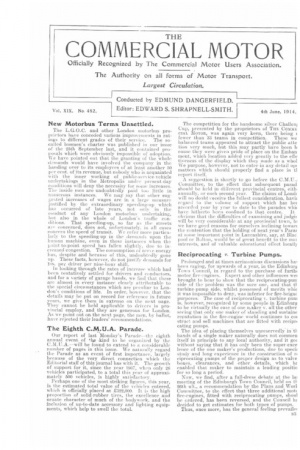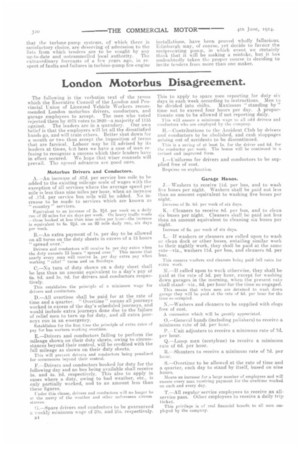New Motorbus Terms Unsettled.
Page 1

Page 2

If you've noticed an error in this article please click here to report it so we can fix it.
The L.G.O.C. and other London motorbus proprietors have conceded various improvements in rat
ings to different grades of their service. The socalled busmen's charter was published in our issue of the 25th September last, and it contained proposals which were obviously impossible of adoption. We have pointed out that the granting of the whole kknnands would have involved the company in the handing over to its employees of at least another 50 per cent. of its revenue, but nobody who is acquainted with the inner working of public-service-vehicle undertakings in the Metropolis under present-day conditions will deny the necessity for some increases. The inside men are undoubtedly paid to little in numerous instances. We may say that other sug
ge i sted increases of wages are n a large measure justified by the extraordinary speeding-up which has occurred of late years, not only in the conduct of any London motorbus undertaking, but also in the. whole of London's traffic conditions. That speeding-up, so far as the streets are concerned, does not, unfortunately, in all cases concern the speed of transit. 1Ve refer more particularly to the speeding-up in the demands upon the human machine, even in those instances when the point-to-point speed has fallen slightly, due to increased congestion. The consumption of nein e energy has, despite and because of this, undoubtedly gone up. These facts, however, do not justify demands for ins. per driver per nine-bout shift.
In looking through the rates of increase which had been tentatively settled for drivers and conductors, and for a variety of garage hands, we find that these are almost in every instance dearly attributable to the special circumstances which are peculiar to London's conditions of life. In order, however, that the details may be put on record for reference in future years, we give them in extenso on the next nage. They cannot be held applicable to drivers in provincial employ, and they are generous for London. As we point out on the next page, the men, by ballot, have rejected their leaders' recommendations.
The Eighth C.M.U.A. Parade.
Our report of last Monday's Parade—the eighth annual event of 4.he .kind to be organized by the be found to extend to a considerable number of pages in this issue. We naturally regard the Parade as an event of first importance, largely because of the very direct connection which the Editorial staff of this journal has with it. The growth of support for it, since the year 1907, when only 26 vehicles participated, to a total this year of approximately 500 vehicles, is highly satisfactory.
Perhaps one of the most striking figures. this year, is the estimated total value of the vehicles entered, which is officially placed at 2322,000. It is the high proportion of solid-rubber tires, the excellence and ornate character of much of the bodywork, and the inclusion of up-to-date accessory and lighting equipments, which help to swell the total.
The competition for the handsome silver Challem Cup, presented by the proprietors of TIIE COIDIE NAL MOTOR, was again very keen, there being fewer than '33 teams in competition. These we balanced teams appeared to attract the public atte tion very much, but this may partly have been b cause they were given pride of place on the Emban ment, which location added very greatly to the effe tiveness of the display which they made as a whol We purpose, however, not to enter in any detail up( matters which should properly find a place in ti report itself.
A suggestion is shortly to go before the C.M.T3.: Committee, to the effect that subsequent parad should be held in different provincial centres, eilh. annually, or each second year. The claims of Lon& will no doubt receive the fullest consideration, havii regard to the volume of .support which has be accorded year by year to date to the parades whi< have hitherto been confined to that, centre. lt, obvious that the difficulties of examining and judgil will be very considerable at any provincial town, bi we have gosd reasons for ourselves inclining Iowan the contention that the holding of next year's Para( at some important point in Lancashire, say, at Blac, pool or Bolton, would be of great benefit to the mac interests, and of valnable educational effect locally Reciprocating v. Turbine Pumps.
Prolonged and at times acrimonious discussions hal been raging, for upwards of a year, in the Edinburp Town Council, in regard to the purchase of furtht motor fire-engines. Expert, and other influences wet brought to bear to show that the reciprocating-pun side of the problem was the sure one, and that ti turbine-pump side, whilst possessed of merits whic it was impossible to deny, was inferior for fire-brigae purposes. The case of reciprocating v. turbine punt is, however, recognized by some people in Edinburg to be virtually the case of one maker v. all the other seeing that. only one maker of standing and sustaine reputation in the fire-engine world continues to col struct and sell machines that are fitted with recipis eating pumps.
The idea of placing themselves unreservedly:inft hands of a single maker naturally does not commen itself in principle to any local authority, and it go( without saying that it has OIlly been the super-exce Ience of the one maker's productions, due to specii study arid long experience in the construction of n ciprocating pumps of the proper design as to valve boxes, clearances, and other details, which hr enabled that maker to maintain a leading positio for so long a period.
Now, we find, after a full-dress debate at the lat meeting of the Edinburgh Town Council, held on 11 26th ult., a recommendation by the Plans and Worl Committee, to the effect that three additional mot( fire-engines, fitted with reciprocating pumps, thou] be ordered, has been reversed, and the Council In decided to get estimates for both types of pumps. Thus, once more, has the genera1 feeling prevailet that the turbine-pump systems, of which there is satisfactory choice, are deserving of admission to the lists from which tenders are to be sought by any up-to-date and untrammelled local authority. The extraordinary forecasts of a few years ago, in respect of faults and failures in turbine-pump fire-engine installations, have been proved wholly fallacious. Edinburgh may, of course, yet decide to favour the reciprocating pinup, in which event we ctrtainly think that it will be making a mistake, but it has undoubtedly taken the proper course in deciding to invite tenders from more than one maker.


























